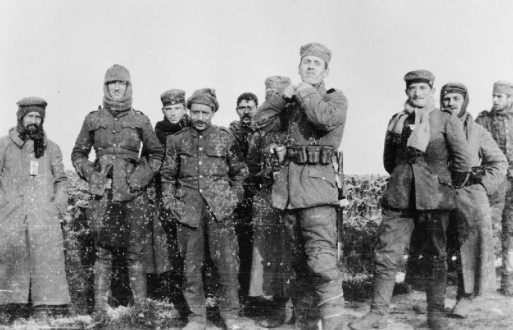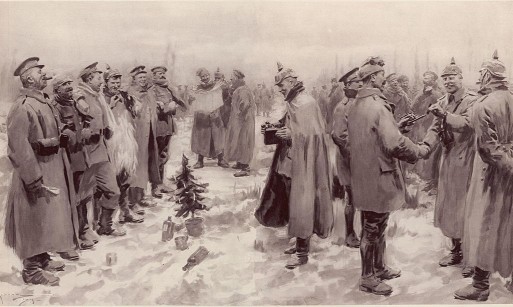On December 25, 1914, British and German troops gave each other one of the greatest gifts of all time: an unofficial truce.
I know that “We’ll stop shooting at your heads for a few days” doesn’t sound like a loving Christmas present, but for soldiers on both sides, it was a miracle.
The truce began after a group of British soldiers put up a sign reading “A Merry Christmas” in view of the German troops on the other side of the trenches. They dropped their weapons and made their way toward the enemy line. A few German troops did the same, meeting the British soldiers in the center. They shook hands.
Just like that, all fighting stopped for the rest of the day. In some areas, fighting had stopped up through the New Year. Soldiers hadn’t been commanded by superior officers to cease fire. In fact, many of them were threatened with a courts-martial afterward.
Despite being trained to kill one another, and often having irate senior officers screaming in their ears to continue the bloody battle, people on both sides remembered each other’s humanity for a few moments.
The Christmas truce was an extreme case of a phenomenon that happened fairly frequently during World War I. British and German troops fighting in the trenches worked together to make the situation more bearable for everyone.
They even played games of target practice, shooting objects way above the other side’s heads to see who was the better shot.
Both sides would stop firing between 6 and 7 p.m. so that they could have dinner in peace. Both sides unofficially agreed that food trucks and bathroom facilities were off-limits to snipers. Both sides refused to shoot when snowstorms set in. They even played games of target practice, shooting objects way above the other side’s heads to see who was the better shot.
On Christmas Day in 1914, British and German soldiers gathered together to bury their dead. The two sides exchanged gifts they had received from their governments earlier: British troops had plum pudding and German troops had pipes.
As The Wall Street Journal‘s Robert M. Sapolsky points out, the only way this truce could work is if both sides had a shared culture.
This is true. The English and German languages share similar origins. More than that, England and Germany have many of the same Christmas traditions. Without this cultural glue tying them together, it’s not likely they would have seen the other side’s humanity enough to call a truce.
On some level, we can all logically recognize the humanity in other human beings.
That’s still only part of the story though. On some level, we can all logically recognize the humanity in other human beings. Army training cannot completely erase that idea in our minds. It can only dull it momentarily. Just because we see someone’s humanity doesn’t mean we are going to risk death or a courts-martial for them.
The truce happened because both sides benefited mutually. No one wanted to get shot at or shoot another person on Christmas Day. It took a great deal of trust to make this happen.
Imagine you’re in the trenches, given orders to shoot the “enemy” on sight. The next day, you’re shaking your enemy’s hand and exchanging gifts with him. How do you know this isn’t a trick? You don’t. All you know is that the other side is taking the same risk.
This is an example of a group of people risking death for tradition. At the end of the day, they’re more concerned about making sure their friends get proper funerals than with shooting at a stranger from a muddy trench.
They were all put in the same traumatizing conditions, forced to spend Christmas away from their loved ones. In that moment, they had more in common with one another than with anyone else on the planet, even the leaders of the countries they were fighting for.
For more information about how cultures celebrate Christmas, read our article here. You can also take a look at our interview with Brad Leary about how people cope with loss during the holidays.

 All’s Fair In Love And War…Except At Christmas
All’s Fair In Love And War…Except At Christmas




 John Mulaney’s “Funeral Planning” on Netflix: No Real Plan
John Mulaney’s “Funeral Planning” on Netflix: No Real Plan

 Composting Bodies Is Now Legal in a Dozen States
Composting Bodies Is Now Legal in a Dozen States














